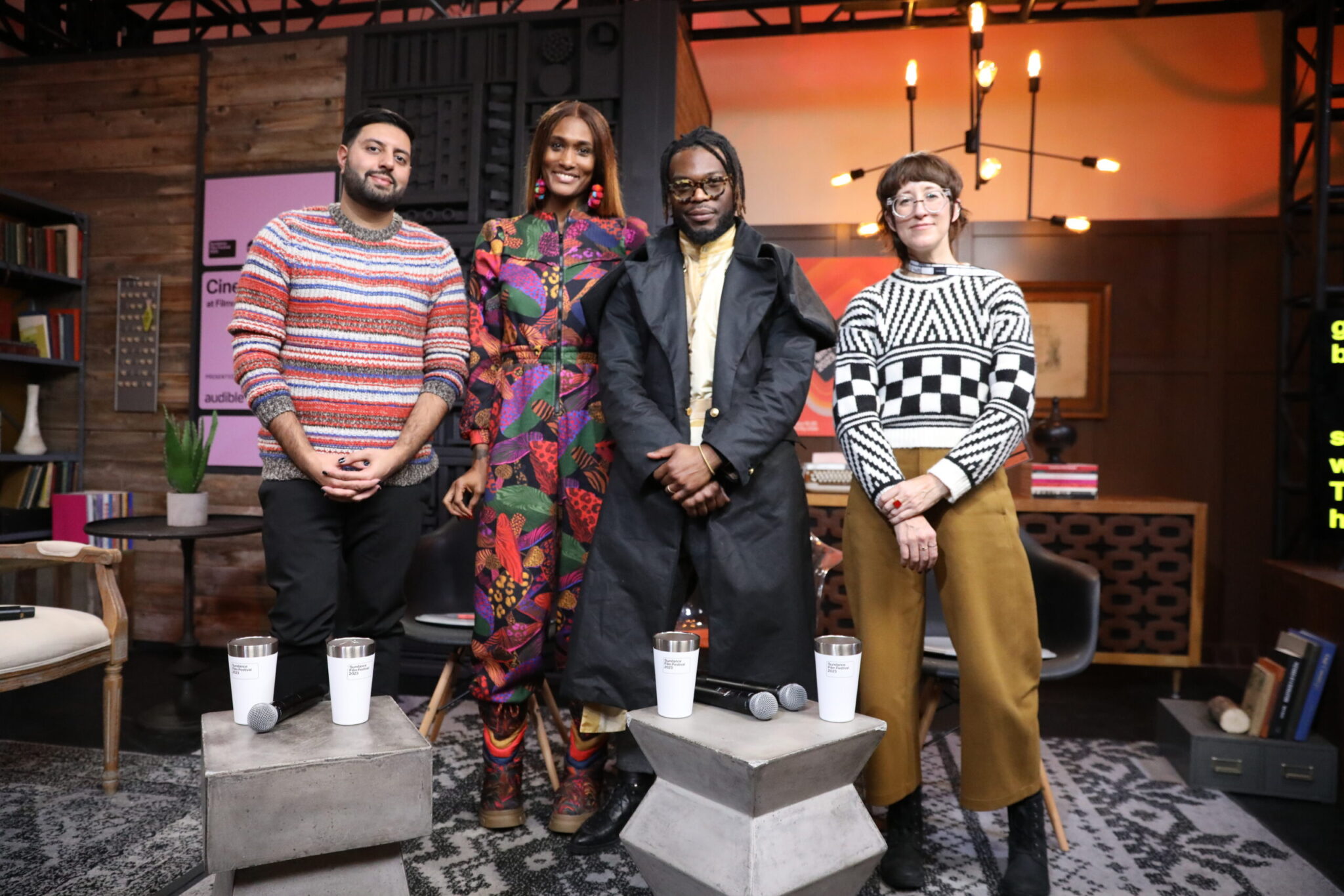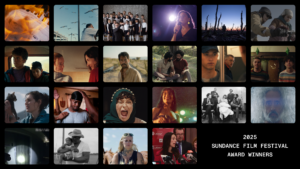Moderator Rishi Rajani, D. Smith, Walé Oyéjidé, and Alison O’Daniel at the 2023 Cinema Café at the Sundance Film Festival
By Stephanie Ornelas
The Sundance Film Festival Beyond Film program kicked off yesterday, and Festivalgoers lined up outside the Filmmaker Lodge on Main Street in Park City for a chance to hear from some of their favorite artists — and these creators had a lot to say. 2023 Sundance Festival artists D. Smith (KOKOMO CITY), Walé Oyéjidé (Bravo! Burkina), and Alison O’Daniel (The Tuba Thieves) stopped by Sundance Institute’s Cinema Café to talk about the lessons they learned as first-time filmmakers and the importance of being intentional with the subjects in their documentaries. They also offered advice for aspiring creators in the room.
Sometimes, you just have to go for it. And if you’re an aspiring filmmaker, chances are you understand how intimidating it can be to enter the world of filmmaking. But these artists offer a little guidance to help aspiring creators get the inspiration they need to take that first step.
Start the project
“Make it now, because you probably have everything you need. Waiting for this giant check to come is not the way to get better at anything,” says Walé Oyéjidé (Bravo! Burkina). “We have iPhones, and everything is so demonetized now. I think there are very few barriers to you sitting where we’re sitting, and everyone is capable of that.”
Commit to your vision
 “Creatively, my advice would be to 100% commit to your vision,” says D. Smith (KOKOMO CITY). “Even if it means cutting everyone out of your creative process until you’ve got down what you feel, and then you bring people along. But to create something that explains and allows that magic out of your body to be released, that’s very sacred. Do not allow anyone to tamper with your creative process.”
“Creatively, my advice would be to 100% commit to your vision,” says D. Smith (KOKOMO CITY). “Even if it means cutting everyone out of your creative process until you’ve got down what you feel, and then you bring people along. But to create something that explains and allows that magic out of your body to be released, that’s very sacred. Do not allow anyone to tamper with your creative process.”
Mind your business
“That means whatever you’re doing, do not compare your work to anyone else’s,” Smith explains. “Do not compare their success or their accolades to what you have and what you don’t have, because it will affect your process. You can’t be creative and jealous at the same time.”
Utilize grants
“I was at a point where I didn’t know where I was going to get money for this project,” says Alison O’Daniel (The Tuba Thieves). “So, I relied on grants. I constantly wrote for funding and whether it was a few thousand here or a few thousand there, that was all I could do. If I got $6,000, I’d say, ‘Okay, how can I use this $6,000 to bring my vision to life?’”
Know your intentions
 “Be very, very clear with what your intention is. And I think the clearer you are, the more convincing you will be in conveying that to people because it’ll be true to you,” says Oyéjidé. “If I come into a place, and I say to you, ‘I recognize that what they say about you is askew from the story. I’m not here to do that.’ People will get on board with this. And, like any relationship, trust builds over time.”
“Be very, very clear with what your intention is. And I think the clearer you are, the more convincing you will be in conveying that to people because it’ll be true to you,” says Oyéjidé. “If I come into a place, and I say to you, ‘I recognize that what they say about you is askew from the story. I’m not here to do that.’ People will get on board with this. And, like any relationship, trust builds over time.”
Understand the power of storytelling
“I was very open, and I acknowledged power and the power that I had in telling the story and editing the story. I went to all these different high schools, and Centennial is in Compton, so all the students are Latino and Black. Here I am as a white woman coming into that space,” O’Daniel says. “I addressed it immediately with them and talked to them about storytelling and representation. That conversation is such a robust conversation now, but when I started this film and was going to that school in 2011, I remember the conversation was happening, but not on the scale it is now. If I want anyone to feel safe, it’s important to be really clear where I’m coming from.”




